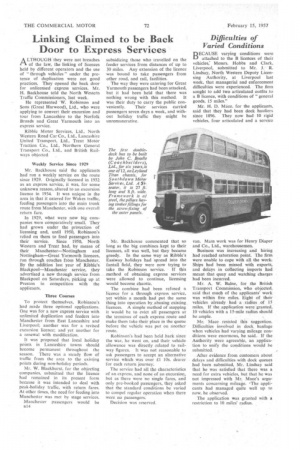Linking Claimed to be Back Door to Express Services
Page 48

If you've noticed an error in this article please click here to report it so we can fix it.
A LTHO UGH they were not breaches rA of the law, the linking of licences held by different operators and the use of "through vehicles" under the pretence of duplication were not good practices. They opened the back door for unlicensed express services, Mr. H. Backhouse told the North Western Traffic Commissioners, last week.
He represented W. Robinson and Sons (Great Harwood), Ltd., who were applying to convert their excursion and tour from Lancashire to the Norfolk Broads and Great Yarmouth into an express service.
Ribble Motor Services, Ltd., North Western Road Car Co., Ltd., Lancashire United Transport, Ltd., Trent Motor Traction Co., Ltd., Northern General Transport Co., Ltd.. and British Railways objected Weekly Service Since 1929 Mr. Backhouse said the applicants had run a weekly service on the route since 1929. Originally licensed in 1932 as an express service, it was, for some unknown reason, altered to an excursion licence in 1934. It was unique in the area in that it catered for Wakes traffic, feeding passengers into the main trunk route from Manchester. with one overall return fare.
In 1929, what were now big companies were comparatively small. They had grown under the protection of licensing and, until 1950, Robinson's relied on them to feed passengers into their service. Since 1950, North Western and Trent had, by means of their Manchester—Nottingham and Nottingham—Great Yarmouth licences, run through coaches from Manchester. By the addition last year of Ribble's Blackpool—Manchester service, they advertised a new through service from Blackpool on Saturdays, picking up at Preston in competition with the applicants.
Three Courses To protect themselves. Robinson's had made three optional applications. One was for a new express service with unlimited duplication and feeders into Manchester from East Lancashire and Liverpool; another was for a revised excursion licence; and yet another for a renewal with modification.
It was proposed that local holiday points in Lancashire towns should become permanent_ throughout the season. There was a steady flow of traffic from the area to the . existing points during non-holiday periods.
Mr. W. Blackhurst, for the objecting companies, submitted that the licence had remained in its present form because it was intended to deal with peak-holiday traffic, with return fares. At other times, the need for feeding into Manchester was met by stage services.
Manchester passengers would be subsidizing those who travelled on the feeder services from distances of up to 30 miles. Any extension of the licence was bound to take passengers from other road, and rail, facilities.
The way they were catering for Great Yarmouth passengers had been attacked, but it had been held that there was nothing wrong with this method. It was their duty to carry the public conveniently. Their services carried passengers seven days a week, and without holiday traffic they might be unrernunerative.
Mr. Back house commented that so long as the big combines, kept to their licences, all was well, but they became greedy. In the same way. as Ribble's Easiway holidays had spread into the fantail field, they were now trying to
take the Robinson service. If this method of obtaining express services were allowed to continue, licensing would become chaotic.
The combine had been refused a licence for a through express service, yet within a month had put the same thing into operation by. abusing existing licences. A simple method of stopping it would be to evict all passengers at the terminus of each express route and make them take their place in the queue before the vehicle was put on another route.
Robinson's had been held hack since the war, he went on, and their vehicle allowance was directly .related to railway figures. It was not reasonable to ask passengers to accept an alternative service which was over El 10s. dearer for each return journey.
The service had all the characteristics of an express, and none of an excursion, but as there were no single fares, and only pre-booked passengers, they asked that the standard conditions be varied to compel regular operation when there were no passengers.
Decision was reserved.
Difficulties of Varied Conditions
BECAUSE varying conditions were attached to the B licences of their vehicles; Messrs. Hobbs and Clark, Liverpool, submitted to Mr. .1. R. Lindsay, North Western Deputy Licensing Authority, at Liverpool last week, that managerial and enforcement difficulties were experienced. The .firm sought to add two articulated outfits to a 13 licence, with conditions of "general goods, 15 miles."
Mr. H. D. Mace. for the applicants, said that they had been dock hauliers since 18%. They now had 10 rigid vehicles, four articulated and a service van. Main work was for Henry Diaper and Co., Ltd., warehousemen.
Business was increasing and hiring had reached saturation point. The firm were unable to cope with all the work: Ships had been missed. with exports, and delays in et:Meeting imports had meant that quay and watching charges had been incurred.
Mr. A. W. Balne, for the British Transport Commission, who objected, said that much of the applicants' work was within five miles. Eight of their vehicles already had -a .radius of 15 miles. If the application were granted, ID vehicles with a 15-mile radius should be ample.
Mr. Mace resisted this suggestion. Difficulties involved in dock haulage when vehicles had varying mileage conditions were enormous, he said. If the Authority were agreeable, an application to unify the conditions would be submitted.
After evidence from customers about delays and difficulties with dock queues had been submitted, Mr. Lindsay said that he was -satisfied that there was a need for extra vehicles, but that he was not impressed with Mr. Maces arguments concerning mileage. The applicants had managed quite well up to now, he observed.
The application was granted with a restriction to 10 miles' radius,




















































































































